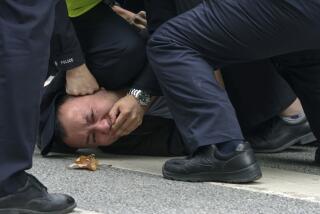Chinese Scientist Calls Party Ouster Unjust, Urges Democratization
- Share via
BEIJING — Chinese scientist Fang Lizhi on Saturday openly espoused the cause of democracy in China and directly challenged the ruling Communist Party in his first public comments since he was purged from the party for allegedly instigating student demonstrations last winter.
“Democratization is a necessary process,” Fang said. “If there is no democratization, there can be no modernization.”
Fang said he felt the Communist Party’s decision to expel him had been unjust. He denied that he had instigated students to demonstrate and rejected the party’s often-repeated charge that last winter’s student protests were a reflection of an ideological drift toward “bourgeois liberalization.”
His remarks served as a warning to the regime that Fang may try to emerge as a Chinese counterpart to Soviet scientist and political dissident Andrei D. Sakharov.
“If a country is democratic and open, there will be no need for a Sakharov,” Fang’s wife, Li Shuxian, said Saturday. “I hope we (in China) won’t have to have a Sakharov.”
Was School Administrator
Fang, 51, one of China’s leading astrophysicists, was serving last year as the vice president of the Chinese University of Science and Technology, in Hefei.
The Hefei campus was the site of the first of a nationwide wave of student demonstrations for democracy that broke out last December. The Hefei students were challenging election procedures that they said gave them no say in the selection of nominees on the ballot for a local people’s congress. Before the students’ demonstration, Fang had expressed sympathy for their cause.
The student protests later spread to Shanghai, where tens of thousands of students took to the streets, and to Beijing, where students staged a New Year’s Day demonstration at Tian An Men Square in the heart of this capital.
Expelled From Party Ranks
In January, Fang was fired from his job at the university and transferred to a research position in Beijing. The Communist Party also expelled him from its ranks, contending that he had instigated students and erroneously advocated what the party called “total Westernization.”
Fang had not spoken out on Chinese soil since these actions were taken. Last month, authorities permitted him to leave China to attend the annual meeting of the International Center of Theoretical Physics in Rome. The regime rejected his request to travel from Rome to another scientific conference in Britain, Fang said.
He spoke out for the first time Saturday to foreign correspondents, who met him at Beijing Airport upon his return to China from his trip abroad.
More to Read
Sign up for Essential California
The most important California stories and recommendations in your inbox every morning.
You may occasionally receive promotional content from the Los Angeles Times.













